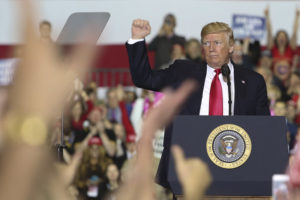![5afcabe92000006505b91b4f[1]](https://eagleeyes1847.com/wp-content/uploads/2018/05/5afcabe92000006505b91b4f1.jpg)
How do Democrats beat Donald Trump? Start by facing an unpleasant truth: Trump’s racism helped elect him.

Why? The Democratic Party increasingly reflects the affluent and educated ― including donors. Their progressivism focuses less on economic concerns than on equity for women and minorities, and single issues like reproductive rights, gun control and environmental stewardship. All these are important ― indeed, urgent. But many white working-class Americans have different, even opposing worries, including a profound sense of economic and cultural marginalization.
This stokes resentment of racial diversity and evolving gender roles. Trump understood this and decided to exploit it. To an extraordinary degree, surveys show, Trump’s racism and sexism helped bond him with his most ardent supporters. It is one thing to deplore this reality; quite another, politically, to ignore it.
True, the Republican Party has practiced racial politics, with varying levels of decorum, since the civil rights revolution of the 1960s. But Trump threw decorum out the window. The forces of change celebrated by Democrats ― increasing diversity, expanding civil rights, the burgeoning influence of the women’s movement, the election of our first black president ― enabled him to become the candidate of white identity.
As the identity of anxious whites became more salient, so did their allegiance to Trump. According to an American National Election Studies survey in early 2016, 36 percent of whites saw their racial identity as “very” or “extremely” important; another 25 percent as “moderately important.”
The survey distilled key drivers of white identity: the sense that whites are discriminated against, that they are losing jobs to minorities and must therefore combat this perceived unfairness. A subsequent analysis of white voters that used this data found that the intensity of these feelings was a principal predictor of support for Trump.
Seen in this light, Trump’s seemingly gratuitous attack on black athletes for kneeling during the national anthem becomes a calculated effort to exploit racial divisions, made more potent by the protesters’ relative economic privilege and Trump’s facile invocation of patriotism. And it worked, terrifying NFL owners fearful of losing market share.
